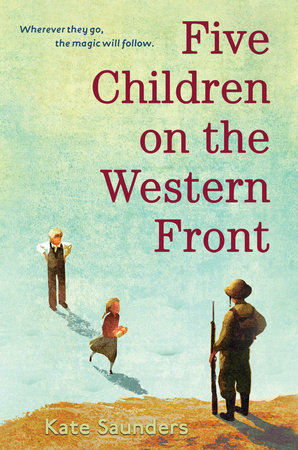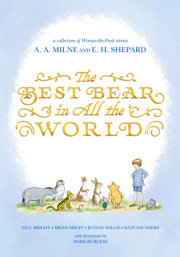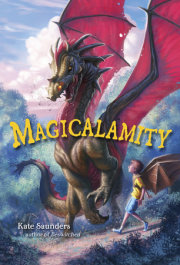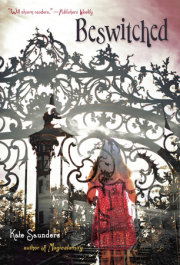One
Nine Years Later
Kent, October 1914
The sand at the bottom of the gravel pit shifted and heaved, and out popped the furry brown head of a most extraordinary creature. His eyes were long stalks, like the horns of a snail, and they shot out to stare at the astonished faces of the Lamb and Edie. It was a gray, blustery day in October; the two youngest children had come to the large, sandy hollow at the bottom of the garden to escape from the fussing inside the house while lunch was being made.
For a moment, they stared at each other in breathless silence.
The creature’s whiskers quivered. “What is the meaning of this? Where am I?”
“It spoke!” whispered Edie. “Did you hear?”
“I think this must be a dream,” the Lamb said slowly. “But I have an odd feeling I’ve seen an animal like this before—maybe in another dream—”
“I am NOT an animal!” the creature snapped. “I’m a senior sand fairy—and you have blundered into my sacred sleeping place. Well, it must have been a mistake, so I’ll forgive you. Shut the door on your way out.”
“This is our garden,” Edie said, wondering why she wasn’t frightened. “It doesn’t have a door.”
“I don’t understand. I should be asleep in the baking sands of the desert, and this place is freezing my blood to a sorbet!” He shivered and wrapped his long arms around his stout little body.
Edie and the Lamb stared at his peculiar pucker of a mouth, his sprawling arms and legs and swivelling eyes, and felt a strange stirring in their deepest memories.
“It’s the Psammead!” the Lamb cried out suddenly, his freckled face glowing with excitement. “Edie, it’s him—from all the stories!”
“But Anthea just made those up,” Edie said doubtfully. “Didn’t she?”
“I think I sort of knew the stories were real. I think I almost remember the Psammead—but last time he came I was only a baby.”
“And I wasn’t even born.” Edie was annoyed. “Everything interesting happened before I was born. It’s not fair. I hate being the youngest!”
“Anthea,” the Psammead said slowly. “One of the little girls I used to know was called Anthea.”
“She’s not a little girl now,” Edie said. “She’s twenty and she goes to art school.”
“Art school? What’s that?”
“It’s where you learn to be an artist. She draws people with no clothes on.”
“I simply don’t understand,” the Psammead said. “What strange civilization is this? Why have I shot back into the future? Where on earth am I?”
“I’m surprised you don’t recognize it,” the Lamb said. “You’ve been here before. This is the White House in Kent—we moved back here when I was little. We’re in the famous gravel pit where you first appeared.”
“But—but—” The Psammead’s long whiskers stiffened with alarm. “You’re the wrong children! Where are MY children?”
“You mean our big brothers and sisters,” the Lamb said. “Cyril, Anthea, Robert and Jane—they’re all here—and I’m the Lamb.”
“What—you?” The Psammead was bewildered. “Nonsense, the Lamb is only a baby—a very sticky, grizzly baby, as I recall.”
The Lamb chuckled. “I’ve grown a bit since then. I’m eleven now, and I’m a day scholar at St. Anselm’s. It’s 1914.”
“Nineteen hundred and fourteen ad!” the Psammead sighed. “I swore I’d have nothing more to do with this GHASTLY new century. If you’re the Lamb, who is this freckly little girl?”
“I’m Edie, short for Edith.” Edie was so enchanted by the Psammead’s cross, faraway voice that she didn’t mind being called “freckly.” “I’m nine, and I wasn’t born when you had all those adventures.” Now that she was getting over the first shock, Edie was starting to realize how wonderful this was—the stories she’d loved so much when she was little had come to life. “I’ve always wished I could see you and talk to you, and you’re so sweet—may I stroke you?”
“Hmmm.” The Psammead was vain and (as the others could have told them) fond of compliments. For the first time, there was a hint of a smile around the furry lips. “If you must, but please ensure that your hands are completely DRY—if I come into contact with the smallest drop of moisture, I’m poorly for weeks.”
“I’ll wipe them on my skirt to be sure.” Edie carefully wiped her hands on the skirt of her blue sailor dress, and reached out to stroke the Psammead’s little round ball of a head. His fur was as soft as mist and as dry as the desert.
“You have a nice gentle touch,” the Psammead said. “You rather remind me of Anthea.”
“Poor thing, you’re shivering. Would you like to sit in my lap?”
“I suppose that might help.”
To Edie’s great delight, the sand fairy allowed her to pick him up—he was heavier than he looked, and his body was lukewarm. She sat him carefully on her lap, wrapping the skirt of her dress around his shoulders.
“If you’re real and not a story after all,” she said, “that means the magic adventures were real too, doesn’t it? Please, could I have a go at flying, like the others did?” This story had always been Edie’s favorite. “When I was little, Anthea drew a picture of me with wings, just like they had. And I wished and wished it was true.”
“They made rather a mess of having wings,” the Lamb said, grinning. “Don’t you remember? They forgot the magic ran out at sunset, and ended up trapped on top of a church tower. Gosh—to think of that really happening! What d’you think, Edie—shall we make having wings our first wish?”
“Excuse me,” the Psammead said frostily. “I will NOT be granting any more wishes.”
This was very disappointing—to get the famous Psammead without the wishes.
“But that’s not fair,” the Lamb said. “It’s not my fault I was a baby the last time you came—and it’s not Edie’s fault she wasn’t born yet. I reckon you owe us at least a wish each.”
The Lamb was a great one for arguing; Father called him the barrack-room lawyer.
“My dear Lamb, can’t you see this is an EMERGENCY?” the Psammead groaned. “I don’t even have enough power to get myself home! For some infernal reason I’ve been de-magicked and dumped here.”
Far away, from the other end of the garden, Mother’s voice called: “Hilary! Edith!”
“That means it’s nearly lunch and we have to go,” Edie said, gently stroking the top of the Psammead’s head with one finger. “It’s a special lunch, a sort of goodbye party for Cyril.”
“For Cyril? Where’s he going?”
“He’s Lieutenant Cyril now,” the Lamb said casually (trying to sound as if this wasn’t the most thrilling thing in the world). “He’s going to the war.”
“War? What are you talking about?”
“Our country is at war with Germany. They’ve got this beastly little tick of an emperor called Kaiser Wilhelm, and they’ve invaded France and Belgium.”
“Some men from the government took all the horses from the farm next door because they’re needed to pull the big guns,” Edie said.
“Hilary! Edith!” Mother called again.
“I seem to have turned over two pages at once,” the Psammead said. “Who is ‘Hilary?’ ”
“Me.” The Lamb pulled a face. “I’m afraid it’s my real name. Please ignore it—Mother’s the only person who uses it.” He stood up, brushing his knees. “You’d better get back into the sand. We’ll dig you out again later.”
“Don’t you dare leave me!” The little creature was horrified. “I REFUSE to have anything to do with this freezing damp sand! If I have to stay in this dreadful place, I’ll make do with the sand bath under Anthea’s bed. Take me there AT ONCE!”
The Lamb and Edie looked at each other helplessly.
“Awfully sorry,” the Lamb said. “Anthea doesn’t keep a bath full of sand under her bed these days.”
“I’ve told you, I can’t stay here. I need someone who knows about looking after sand fairies.”
“We’ll have to tell the Bigguns sometime,” Edie said (this was the family name for the four eldest children). “Won’t they be happy to see the Psammead again?”
“Hmm, I don’t know about that,” the Lamb said. “He hasn’t exactly popped out at the most convenient time.”
“I could run and fetch them now—”
“They won’t believe you.” The Lamb was old enough to know that their big brothers and sisters were far too busy and impatient to listen to stuff about the old stories—especially today, when everything was at sixes and sevens.
“Hilary! Edith!”
“Nothing else for it—we’ll have to take him up to the house. They’ll have to listen when they actually see him. Can you carry him in your skirt?”
“No, he’s too heavy—and his legs are too long.”
The Lamb shrugged off his tweed jacket. “I’ll wrap him in this and carry him in my arms.” He spread it out on the sand beside Edie.
“I don’t seem to have much choice.” The Psammead hopped from Edie’s lap onto the jacket, and yelped angrily. “Ouch! I’m sitting on something knobbly!”
“Sorry,” the Lamb said. “The pockets are full of conkers.”
The Psammead pulled his eyes back into his head, until his face was nothing but a crease of crossness. “Hurry up—I’m freezing!”
Copyright © 2016 by Kate Saunders. All rights reserved. No part of this excerpt may be reproduced or reprinted without permission in writing from the publisher.









